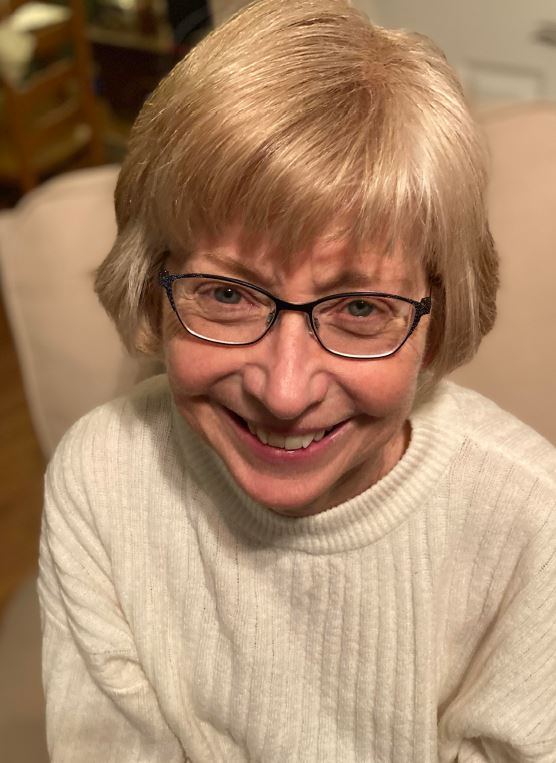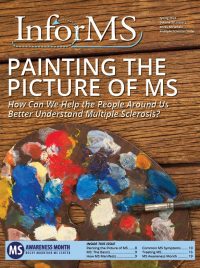
Kitty is 66 years old and was diagnosed 34 years ago.
What symptoms were you experiencing prior to your diagnosis?
I was driving to my home in Westminster and the exit to the expressway was a lefthand exit. As I drove toward the exit, I kept looking over my shoulder to change lanes, but my eyes wouldn’t go in that direction. It turned out it was optic neuritis. They sent me to a neuro-ophthalmologist who sent a letter to my doctor saying, “She has MS but don’t tell her because she needs a second symptom to get diagnosed.” Three months later I had a bout of trigeminal neuralgia which was intense pain in my ear, eyes, and face. My doctor first suggested physical therapy and that didn’t help. And then I saw a neurologist and was diagnosed with MS.
How has MS impacted your life over the years?
The first thing that really surprised me is that I didn’t think I would have to quit working so soon. I was working in public relations at the Denver Art Museum. I was giving tours, serving as the media coordinator, and walking up and down the stairs with people. And I thought, I’m going to have to switch careers because I’m not going to be able to walk.
I went back to school, got a computer programing degree, and switched careers. I’d been working at a computer consulting firm for five years and was receiving superlative reviews every year. Then one year, they knew something had changed and wondered what was going on with me. I said, “Well, it’s this MS.” I hadn’t realized that cognitive issues were just as big as mobility issues for me. I would work all morning and go home and take a nap, and then I would come back, and I couldn’t remember a thing I had done that morning. This went on for a while and I decided to take disability after a couple more months. It was too embarrassing, and I couldn’t be productive. That was kind of heartbreaking.
I kept trying to work for a while, and that was difficult because I didn’t have strength. Trying to keep being a mother to my two sons, keep doing the cooking and the cleaning when I didn’t have energy was very challenging.
What does your support system look like?
When I was diagnosed, we had just moved to Denver from Oklahoma six months earlier. My husband did not know what to do about it and I can’t say that he was terribly supportive. I ended up researching at the library and there was nothing very helpful back then in 1987. It just scared the living daylights out of me. I did tell my coworkers and they were very supportive.
After I left my job several years later, I’d already gotten involved with the Rocky Mountain MS Center’s Hydrotherapy classes with Michele Harrison and had begun to make friends with people in that group. Other people with MS became core to my support system- they are the greatest people, very nice and fun to be with. Finding friends is the most important thing. My MS friends and I go to dinner or lunch together. We all have walkers, and we all have canes, and we have wheelchairs, and we show up at an Outback or a Chilis. And we have fun.
What are some of your favorite coping mechanisms?
About 12 years ago, I discovered meditation and joined a mindful meditation group and that has been very helpful. It helps to calm me. Exercise has always helped me, and I keep doing lots of exercise, including swimming and Pilates. And spending time with my friends in the meditation group and my MS friends.
The simplest meditation process that helps me is to just follow my breath. You just sit very still in a comfortable position, and then you simply notice your breath as it comes in and goes out. Pay attention all the way in and all the way out. And it seems like you aren’t doing anything, but after about 20 minutes or so, it really helps to calm and settle me down and makes a real difference in how I feel and interact with the world.
What are things that you’ve learned while living with MS?
You find new ways. It takes a while. When something would happen – like I’d fall off another step or have a new symptom — I’d have a little grieving period and think to myself, “Oh, woe is me.” And then, I think “Okay, this is the new me, let’s go from here.” Maybe it will change, maybe it will get better, maybe it will get worse, but I’m going to work with what I have. Meditation helps to ground me and remind me to live in the moment, and to work with what I have, because that’s what I have.
Physically, it’s not going to get better, but my life got better. I’m never going to run again. But I can still cook, I can still laugh. I love golfing with the disabled program, and I go to the driving range. And that’s so fun. You make do, you find ways. It may not be the way it used to be. Things change and you just keep going. You find new ways.
I’ve also learned to ask for help. “Pulling yourself up by the bootstraps” isn’t possible – it’s the people who help you, it’s the people you spend time with, the books you read, and the things you learn. It’s so important to keep trying to do what you can, and then when you hit a wall where you can’t do it, you ask someone for help.
And that can be a challenge. I use this little electric cart at the grocery store, and for a while, I was so ashamed. I would be getting up out of the chair to reach up high to get something, and someone would come dashing over, “oh let me get that for you, let me get that for you.” And I’d say “no, no, no I can do this.” And then they would turn, and they would walk away. After a couple of times I thought well that was their opportunity to be generous, and I didn’t allow them to be generous. So, now if I start to get up and get something off the shelf, and someone comes up and offers to help me, I say “thank you very much, I’d appreciate that.” And they just glow. Yes, I could have done it, but they just glow. They were able to give me help and that’s great for both of us.
Finding ways also means finding and accepting adaptations that work for me. Now, when I go to the grocery store, I get in the cart right away – I don’t pretend that I can walk back and forth up the aisles. I had an opportunity to buy a motorized wheelchair long before I needed it, and so I did. Now I use it to walk my dog so I can keep up with her. And I use it to go to the pool because I know my legs might be tired after swimming. It makes me feel a little bit more in control. It makes me feel like I’m not just flying in the wind, not the victim out there getting whacked. I can’t control what is going to happen to my body. But I can do the things that the doctors tell me to do, take all the medicines, and I exercise when I can.
What gives you hope?
Well as a Buddhist, we don’t do hope and fear. So, I don’t hope for things that may or may not happen. And I don’t fear things that may or may not happen. I live in the moment. But I am so thrilled that people who are newly diagnosed are getting medicine right away. That gives me hope that this disease will not afflict so many people the way it has afflicted my generation and generations before me.






